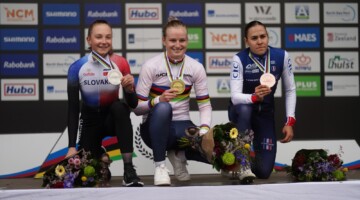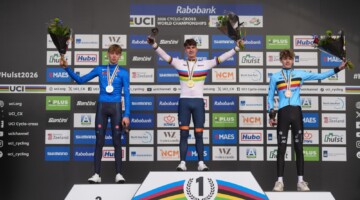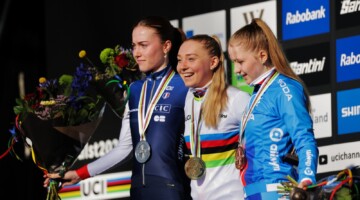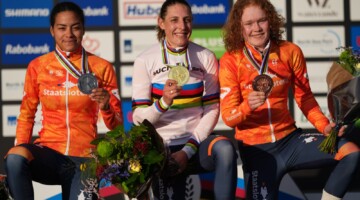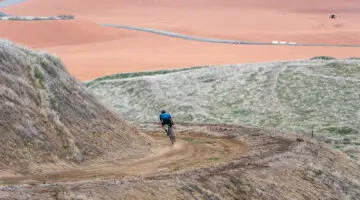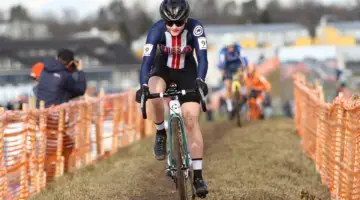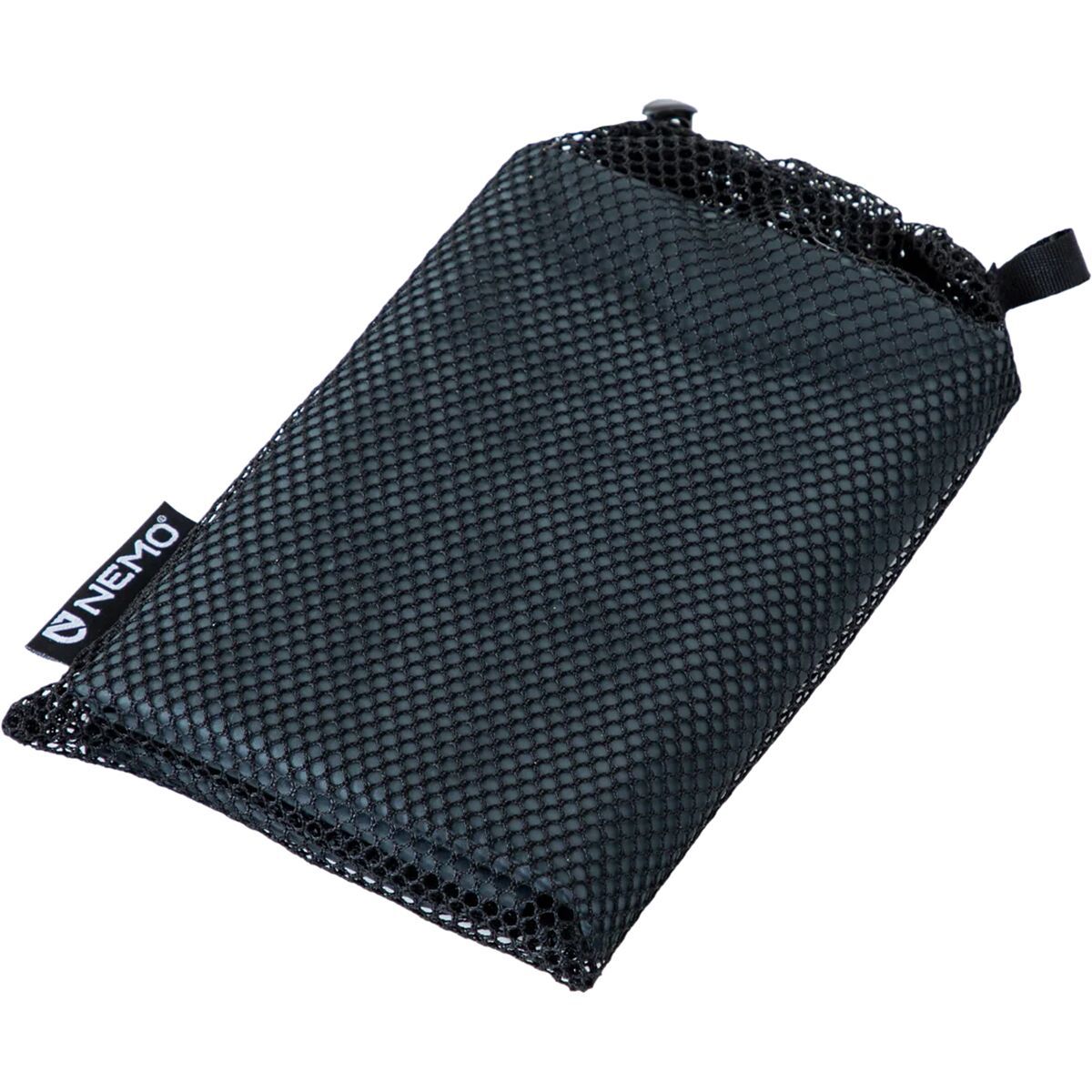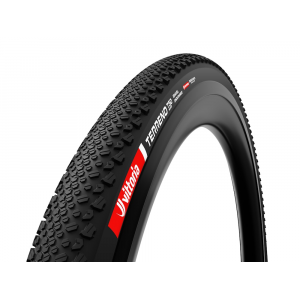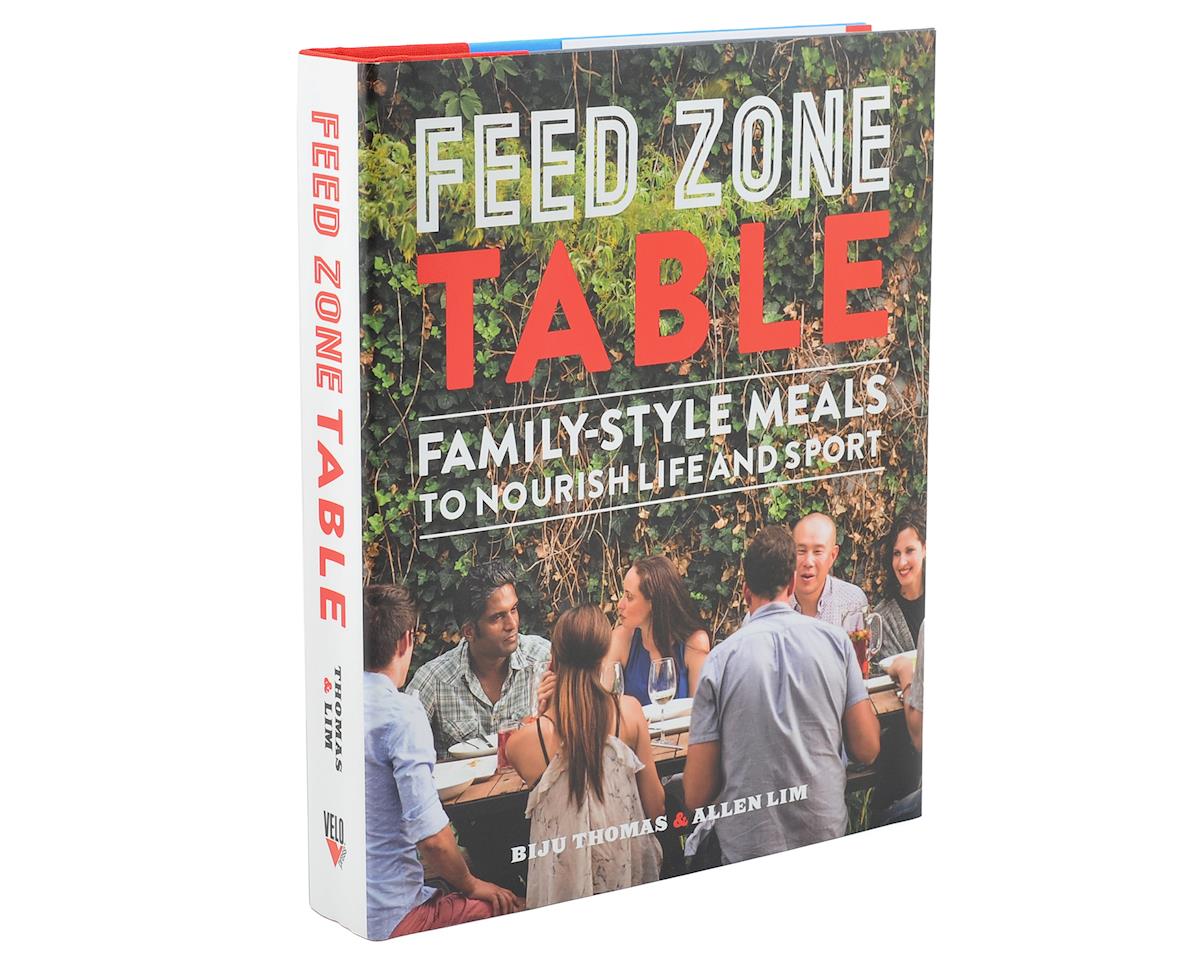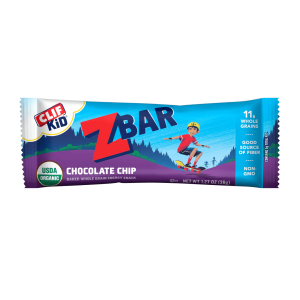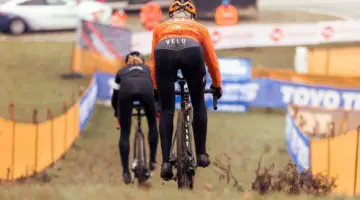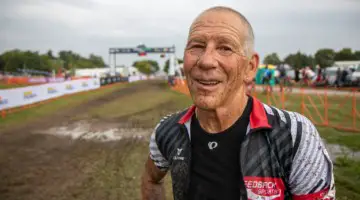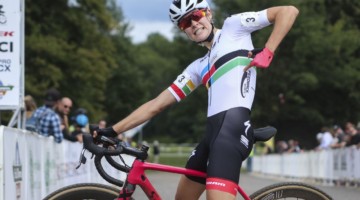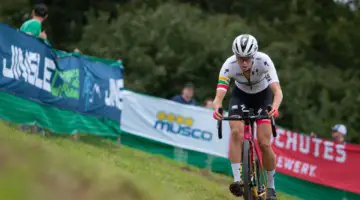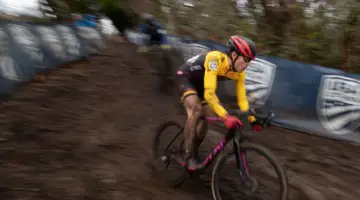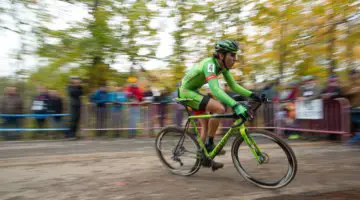[First of all, if you live in the U.S. and haven’t yet, preview your ballot and then please go vote today if you’re able, before worrying about cyclocross and training for it. Even if you hate politics, national and local elections can have a major impact on your rights, access and infrastructure you enjoy as a cyclist. Now back to our regular programming…]
One of the many reasons some of us love cyclocross is that it’s not a sport that demands a pin-thin physique to do well. Anyone who has seen the burly former Worlds team member Justin Robinson race has proof of this fact.
Yet many of obsess over a pound on our bike, while carrying way more more than that in our love handles, and that figure, no pun intended, can increase pretty quickly. For example, you’re fit, riding well, ready for the season or in the middle of the season, and a bad injury gets you off your bike—not for a lap or race—but for a few weeks. Suddenly, your weekly physical activity drops dramatically, but your eating habits and portions don’t change. Before you even notice, you gain more than a few pounds. It can happen to anyone.
So you start playing around with mobile app like Fitbit or MyFitnessPal that makes logging food consumption relatively easy, and after logging your food for the first time in your life, you’re amazed at the calorie content of some of the foods you regularly eat. By simply recording what you eat, and taking note of your activity for the day, your weight starts to head back in the right direction. Easy enough, right?
But can you continue to shed weight during the season effectively while racing and training? How might it impact your training and racing? What are the pitfalls to avoid? These (true) events and questions inspired us to ask the coach, Chris Mayhew of JBV Coaching, for today’s Training Tuesday topic. Your wait is over.
Weight loss. It’s a topic near and dear to most bike racers’ heart. There are many good articles on the issue and probably at least as many bad ones. And there are people that make a living advising specifically on this topic. The advice I want to give here is what I would give you as a coach. I’d also like to reframe some problems I see in clients as well. It’s pretty easy to get wound around the axle with the topic of weight and competitive cycling and end up in a pretty unhealthy state. So let’s see if we can avoid that.
Timing is Everything
First and foremost, now is not the time to try and lose weight. Cyclocross is particularly intense and that intensity relies on stored glycogen for fuel. You can’t soft pedal a cross race and burn fat. You also can’t take the first hour easy and ingest some carbs to fuel the rest of the ride. Everything you need to fuel your race has to already be processed and stored in your body and ready for use. So even a small deficit in fueling can lead to a hazy last lap or two when you most need glycogen to fuel both your legs to pedal hard and your brain to make good choices in line selection or passing.
My general fueling recommendations are to get something down within 30-45 mins post-race. What form that takes is up to you, just get something in. Then plan a real meal two or three hours out. If you can, make that a meal from the local food truck. It’s always amazing local food and you’re supporting people who support your sport.
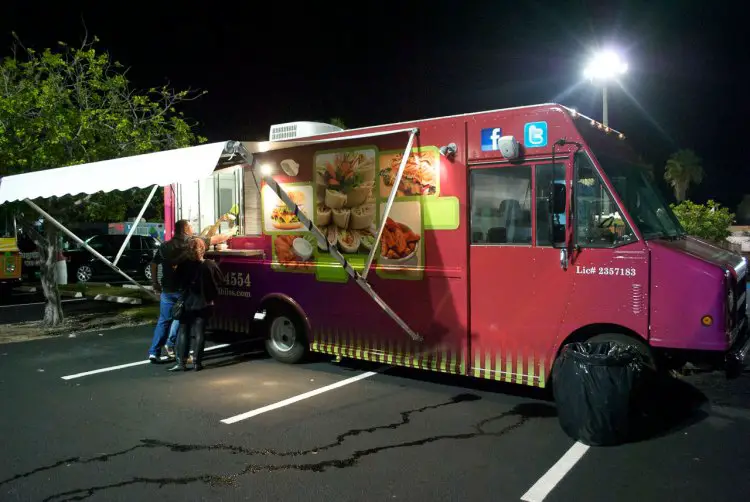
Go ahead, race local, eat local by supporting your local food track at the race. photo: Bob B. Brown
If you’re not hanging out at the venue that long find somewhere local to eat, maybe with your host for the weekend. Within reason, I think how many calories you consume this time of year is as important as what you consume. Find food that you will enjoy eating in good company. You may find you want a small snack around bedtime too, which is fine. Replacing glycogen is a rate-limited process, that is there’s only so much you can make per hour. So spacing meals out helps you fuel better than eating one giant meal post-race. Eating like that also lets you use hunger as a guide for eating, which is a good thing to be in tune with. Basically, don’t be hungry during race season.
“Cyclocross is particularly intense and that intensity relies on stored glycogen for fuel. You can’t soft pedal a cross race and burn fat. You also can’t take the first hour easy and ingest some carbs to fuel the rest of the ride.”
You’ll notice the above is a lot of encouragement to eat. At the amateur level that’s how it should be. You’re not getting paid to ride your bike, so every last performance gain is not nearly as important as enjoying what you’re doing. And once you start obsessing about food things can become very unfun for those around you, especially if you have a partner or family. I believe it’s Allen Lim who says “don’t be an a****** about food.” Be as smart as you can about food selection but keep it fun and palatable and easy on those around you. Happy racers go faster, to quote Kristen Keim. If the people around you aren’t happy, or you’re not eating enough to be happy, bike racing is not going to be fun.
“You’re not getting paid to ride your bike, so every last performance gain is not nearly as important as enjoying what you’re doing. And once you start obsessing about food things can become very unfun for those around you, especially if you have a partner or family.”
Forget Ferrari, Food Deprivation
A lot of the emphasis on weight comes from the watts to kilogram ratio that has become so popular (even infamous, thanks to a banned doctor) in the last 15 or so years. It’s pretty easy to measure the watts side of the equation with a power meter and the kilogram side with a scale. In my experience, most people focus too much on weight and not enough on making watts. Focus on training well and doing the most than you can within your limitations there. And think about how to best fuel those efforts for maximal performance (and caloric burn). Depriving yourself of food to lose weight means you don’t have enough fuel to do quality workouts day in and day out. If you can learn that food isn’t something to be withheld, thought of as a reward, or something you earn, you’re going to be a lot healthier mentally and physically. So many people in competitive cycling, have disordered thinking because we get into the mindset of focusing on withholding food to lose weight (or worse, to punish ourselves for a subpar performance) rather than thinking about when and how we can eat food to go faster. It’s not a fun place to be, so let’s avoid that.
“Depriving yourself of food to lose weight means you don’t have enough fuel to do quality workouts day in and day out.”
And one of the great things about cross is that pure aerobic watts to kilogram don’t matter nearly as much as it does in road racing. We’re not doing 30-60 min climbs that are largely living physics equations. Bike handling, anaerobic power and repeatability all matter much more in our sport. You need a few extra pounds of muscle to handle the core and upper body demands of cyclocross—being the thinnest you can possible be will probably not further your goals.
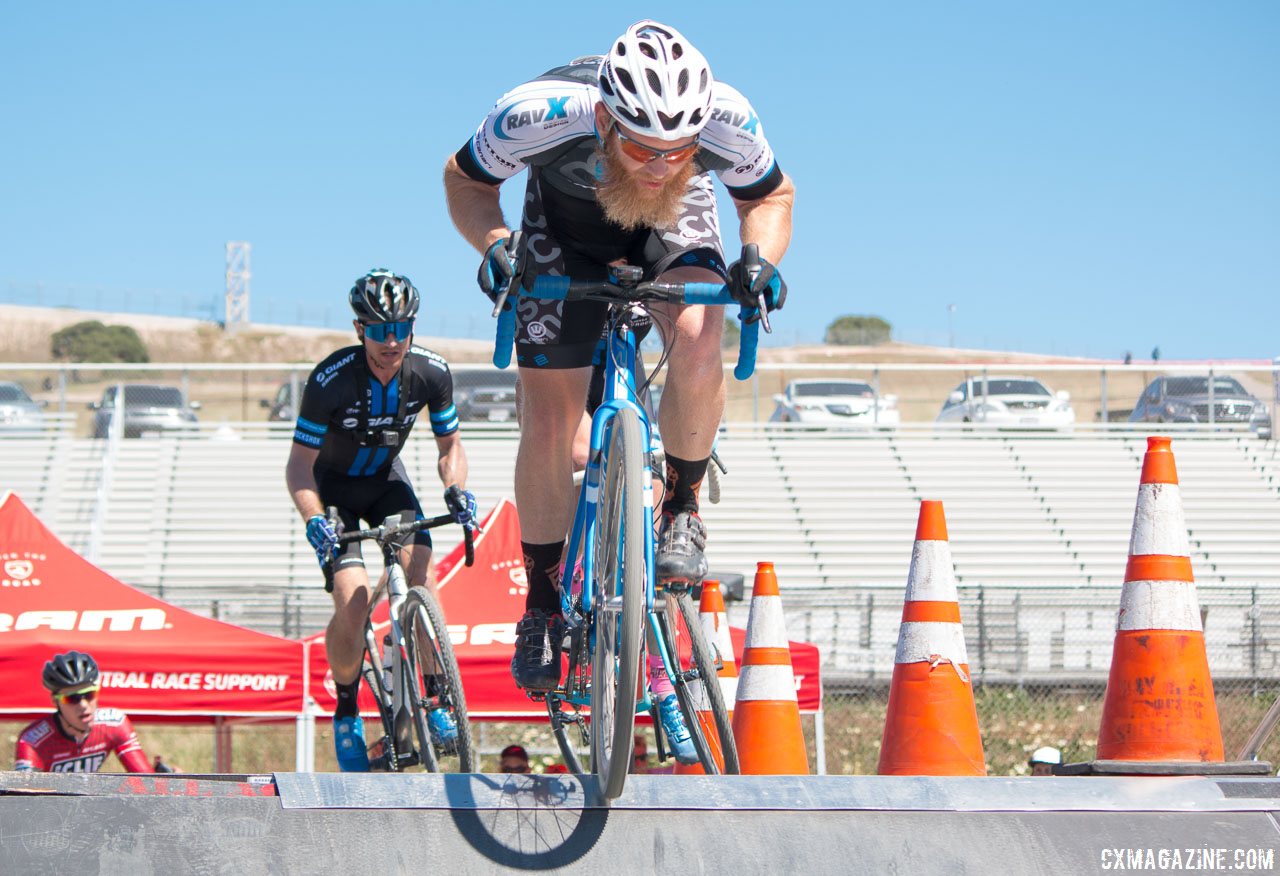
You need muscle in cyclocross, and former football player Robert Marion puts his to good use in racing cyclocross professionally. photo: Sea Otter Classic 2016 Cyclocross Race. © Cyclocross Magazine
That’s doubly true if your goals are to have a good race, but also enjoy hanging out drinking a beer afterwards with your friends. Peter Glassford calls it “armor for life” in this excellent podcast. Don’t lose weight to the point you can’t be a functional human.
Wait to Watch Weight
So when should you think about weight loss? The best time is starting in the offseason. Take a couple of weeks at the end of your season and eat how you want. You’ll probably gain a few pounds, and that’s totally normal. Race weight isn’t necessarily something that can or should be sustained all year long. But set some deadlines and decide when you want to start taking measures towards your goals. Weight loss, like fitness, is a gradual process. Figure out where you’d like to be, shoot for losing a pound or so a week, and work backwards from your target date and see when you need to get started.
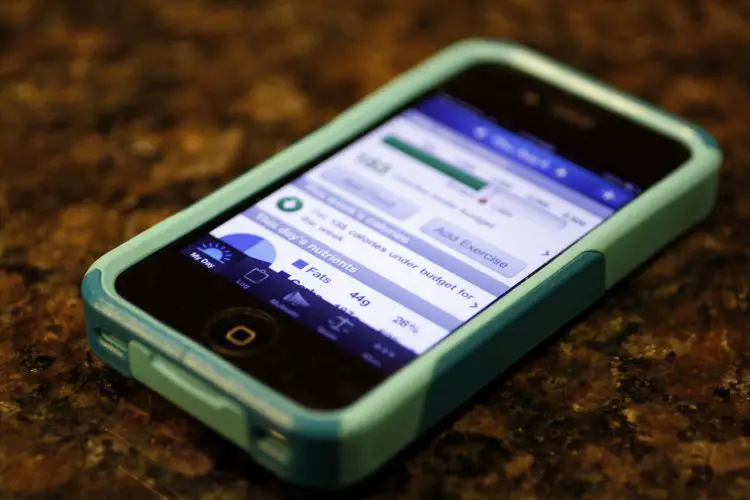
Many of the mobile apps, like MyFitnessPal and Fitbit, make setting a goal and tracking activities and calories very easy. The apps also are helpful in letting you know when your weight loss goal is overly ambitious. photo: Jessica
Make sure you pick a realistic goal. Everyone I know has a current weight, desired weight, and long term goal weight. My first question is always “when’s the last time you weighed that much?” Don’t set yourself up for failure with an unrealistic or arbitrary goal, and realize most everyone wants to weigh five pounds less than they do, no matter what.
Once you decide to work towards your goal, what should you do? Start documenting your food intake. Again, don’t focus on “not eating.” Focus on what you are eating. This blog post by Jeff Koontz is a great read in that regard. A lot of people just aren’t aware of the calories they’re taking in. It also makes it easier to see where you could cut some easy calories, be that beer or soft drinks.
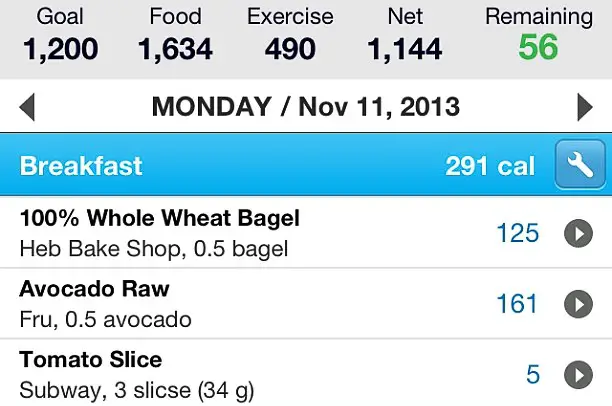
Mobile apps like MyFitnessPal make logging your consumption easy, with millions of items in its database, plus a UPC code scanner. photo: Jessica Mullen
Documenting your food makes you more thoughtful about what you’re doing, and considerate of each thing you’re eating. That thoughtfulness, really, should be your ultimate goal and will make keeping that weight off more sustainable. Documenting is an easy step that avoids turning food into a reward or punishment. You’re not passing judgement on what you’re eating, just making factual note of it. And hopefully realizing that you have really high caloric demands around training, and maybe not as much on your recovery days.
From there, if that’s not enough to make slow progress towards your goal, I’d recommend talking to someone who has some specialized training in the matter. Some coaches have that. Others, like myself, would pass you on to experts who they trust. But talk to someone who can make solid, actionable recommendations and understands your sport and lifestyle. From there, implement their plan and give it time. Nothing is going to happen overnight, or even over a couple of weeks. Much like your fitness, you’re not going to gain 50 watts overnight, so be gentle and patient with yourself.
I’m aware of how much a lot of this sounds like platitudes. But despite what banner ads on sketchy websites would have you think, there is no one easy trick to weight loss. It’s a hard thing to do and in cycling it’s surrounded with a lot of negativity and disordered eating. You want to avoid that, trust me. The main things to focus on with weight loss is not to let one single number become an arbitrary goal. Figure out what will further your cycling goals, and benefit your own health and well-being. Figure out when you can focus on working towards those goals, realizing that racing season is not the time for that. Start documenting what you are doing to get a baseline. Then consult with someone who can give you solid advice on how to work towards your goals, and settle into the process of slow, steady work every day.
“…there is no one easy trick to weight loss. It’s a hard thing to do and in cycling it’s surrounded with a lot of negativity and disordered eating. You want to avoid that, trust me.”
Have your best cyclocross season ever with all of our Training and Technique Tuesday pieces here from coaches Mayhew, Adam Myerson and Kenneth Lundgren and others. Can’t get enough? See our Cyclocross Academy and Cyclocross 101 articles here.


